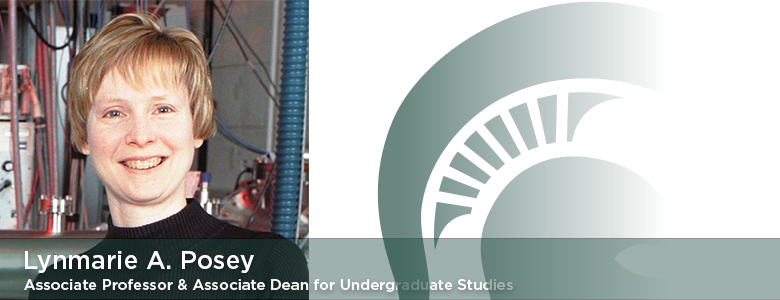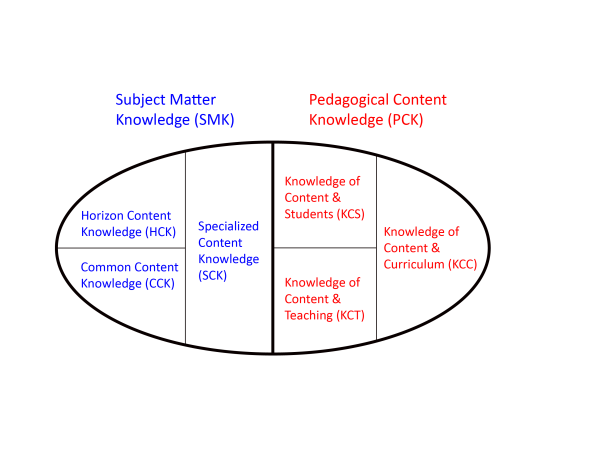Lynmarie A. Posey

Research
Mathematics in Chemistry Education
(Research Description PDF)
Building Chemistry and Mathematics Understanding at the Introductory Level – In 2012, the President’s Council of Advisors on Science and Technology (PCAST) reported that one million additional college graduates with STEM degrees would be needed over the next 10 years to meet the anticipated demand for technically skilled workers. Unfortunately, many students interested in pursuing STEM careers enter college without the background and skills required to succeed in general chemistry, which is often the first required science course. In fact, fewer than 40% of the students who enter college as STEM majors graduate with a STEM degree.
Developmental chemistry courses to support underprepared students have typically focused on drilling algorithmic problemsolving rather than on helping students to construct an understanding of core ideas in chemistry and make meaning of the supporting mathematics. We are studying a new approach built around core ideas in chemistry: 1) bonding and electrostatic interactions, 2) structure and properties of matter, and 3) energy. Since learning is a developmental process, we aim to help students build increasingly complex and scientifically correct understanding of these core ideas, which is both transferable and robust, by carefully scaffolding their learning on existing knowledge. We blend scientific practices (using models, constructing scientific explanations, and applying mathematical thinking) with content in instruction to further support students in building and using their knowledge. We are studying the impact of this novel approach to developmental chemistry on student motivation, self-efficacy, science identity, and success in general chemistry.
We have found that even when scientific practices largely replace traditional chemistry calculations, student success in our developmental chemistry course strongly correlates with mathematics background. Students in our course often struggle with the same mathematics that students in noncredit- bearing-remedial (NCBR) algebra courses find most challenging. These topics include: 1) proportional reasoning; 2) linear rates of change and interpreting the rate of change from a graph; 3) modeling of covarying relationships with functions; and 4) translating between multiple representations. In collaboration with mathematics education researchers, we are developing and studying the impact of interventions that use multiple representations to build student understanding of mathematics used in college chemistry courses at the introductory level.
Mathematical Knowledge for Teaching in Chemistry – A cross-disciplinary team is undertaking a study to characterize the mathematical knowledge for teaching (MKT) needed to effectively teach the mathematics used in general chemistry courses for STEM majors. MKT is comprised of mathematics subject matter knowledge (SMK) and pedagogical content knowledge (PCK) unique to the work of teaching (see Figure below). PCK includes knowledge of content and students (KCS) such as how students learn mathematics as well as their understandings and misunderstandings, knowledge of content and teaching (KCT), i.e. mathematics pedagogy, and knowledge of content and curriculum (KCC). While most chemistry instructors possess strong SMK in mathematics, their PCK is often less developed. Our work will inform efforts to build chemistry instructors’ MKT to increase the effectiveness of mathematics instruction in support of chemistry learning. Data sources for this project include analysis of general chemistry textbooks, video-recorded observations of classroom instruction, and instructor interviews.

Contact / Webpage
Area(s) of Interest
Chemical Education (CE)
Biological (Bi)
Physical (Ph)
Selected Publications
Characterizing college science instruction: The Three-Dimensional Learning Observation Protocol, Bain, K., et al., PLoS ONE 2020, 15(6): e0234640. https://doi. org/10.1371/journal.pone.0234640.
Mathematical knowledge for teaching in chemistry: Identifying opportunities to advance instruction, Posey, L. A.; Bieda, K. N.; Mosley, P. L.; Fessler, C. J.; Kuechle, V. A. B., in It’s Just Math: Research on Students’ Understanding of Chemistry and Mathematics (ACS Symposium Series); Towns, M., Bain, K., Rodriguez, J.-M., Eds.; American Chemical Society: Washington, DC, 2019, 135-155. https://pubs.acs.org/ doi/10.1021/bk-2019-1316.ch009.
Helping students to “do science”: Characterizing scientific practices in general chemistry laboratory curricula, Carmel, J. H.; Herrington, D. G.; Posey, L. A.; Ward, J. S.; Pollock, A. M.; Cooper, M. M. J. Chem. Educ. 2019, 96, 423-434. https:// pubs.acs.org/doi/full/10.1021/acs. jchemed.8b00912.
Evaluating the extent of a large-scale transformation in gateway science courses, Matz, R. L.; Fata-Hartley, C. L.; Posey, L. A.; Laverty, J. T.; Underwood, S. M.; Carmel, J. H.; Herrington, D. G.; Stowe, R. L.; Caballero, M. D.; Ebert-May, D.; Cooper, M. M., Sci. Adv. 2018, 4, eaau0554. https://pubmed.ncbi. nlm.nih.gov/30397646/.
Adapting assessment tasks to support three-dimensional learning, Underwood, S. M.; Posey, L. A.; Herrington, D. G.; Carmel, J. H.; Cooper, M. M., J. Chem. Educ. 2018, 95, 207–217. https://pubs.acs.org/doi/ full/10.1021/acs.jchemed.7b00645.
Core ideas and topics: Building up or drilling down?, Cooper, M. M.; Posey, L. A.; Underwood, S. M., J. Chem. Educ. 2017, 94, 541–548. https://doi.org/10.1021/acs. jchemed.6b00900.
CV
B.S., 1984, Davidson College
Ph.D., 1989, Yale Univ.
NSF Postdoctoral Research Fellow, 1989-1991, Stanford Univ.
Assistant Professor, 1991-1998, Associate Professor, 1998, Vanderbilt Univ.
Awards
| Year | Award | Organization |
|---|---|---|
| 2020 | Undergraduate Teaching Award | College of Natural Science |
| 2019 | Faculty Teaching Prize | College of Natural Science |
| 2016 | Faculty Teaching Prize | Michigan State University (College of Natural Science) |
| 1989 | Ph.D. | Yale University |
| 1989 - 1991 | Postdoctoral Research Fellow | National Science Foundation (Stanford University) |
| 1984 | Bachelor of Science | Davidson College |